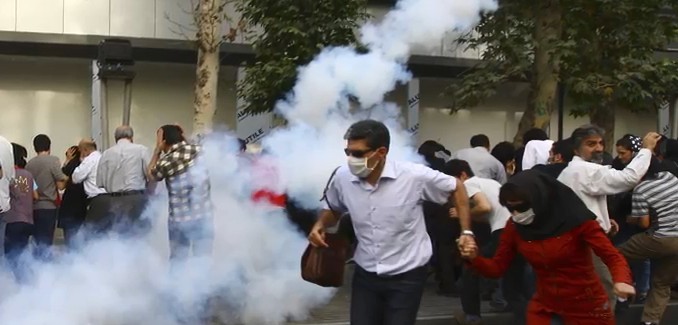Iran’s intelligence services have been threatening and blackmailing numerous journalists to ensure positive coverage for the regime in global media outlets, according to a report released by Reporters Without Borders (or RSF).
The watchdog group, which advocates for freedom of the press, estimates that at least 50 international journalists have been subjected to threats by Iranian authorities over the past year. The intelligence services go as far as arresting family members of reporters to influence their coverage and cover up the regime’s human rights abuses and other illicit activities.
Arman Mostofi, the director of Radio Farda, told RSF that four of his reporters have received death threats. “These threats are obviously not signed,” Mostofi said, adding that “they sometimes take the form of a comment beneath an article…Sometimes the message includes information that only members of the intelligence services could know.”
The RSF report also detailed how leading international media outlets such as the BBC and Voice of America had their computers hijacked by Iranian authorities. “All international media outlets with Persian-language services are concerned” about the Islamic Republic’s blackmailing tactics.
“In the past year, RSF has learned of ten families of journalists who have been summoned to such interviews, usually with intelligence ministry agents,” according to the report. “In all, at least 50 journalists based abroad have been threatened in some way in the same period. At least 16 of them have received death threats.”
Iran also deploys scare techniques outside of its borders to pressure reporters. During international nuclear negotiations in Vienna, Iran’s intelligence services monitored and tracked journalists who were covering events in the country.
“It was insane,” one reporter, who was present during the negotiations and is critical of the regime, told the Washington Free Beacon. “They would openly get in the faces of Iranian reporters from Western outlets and take pictures just to make sure that the journalists knew that the regime knew who they were and they were being watched,” he said. The reporter added, “it’s impossible to imagine this didn’t significantly influences the coverage that came out of the nuclear talks, and even more broadly.”
Iran is among the worst violators of press freedom in the world, ranking 165th out of 180 countries in RSF’s 2017 World Press Freedom Index.
In March of 2015, a former media adviser for Iranian President Hassan Rouhani defected in Lausanne, Switzerland during nuclear talks there, saying that his “conscience would not allow me to carry out my profession in this manner any more,” because he could “only write what he was told” by the regime.
Two months later, Iranian Foreign Minister Mohammad Javad Zarif considered by some to be a moderate, told Charlie Rose in response to a question about The Washington Post reporter Jason Rezaian who was imprisoned by Iran at the time, that Iran doesn’t imprison journalists. Zarif’s denial earned him the scorn of human rights activists.
[Photo: Committee to Protect Journalists / YouTube]




